 Petzlover
Petzlover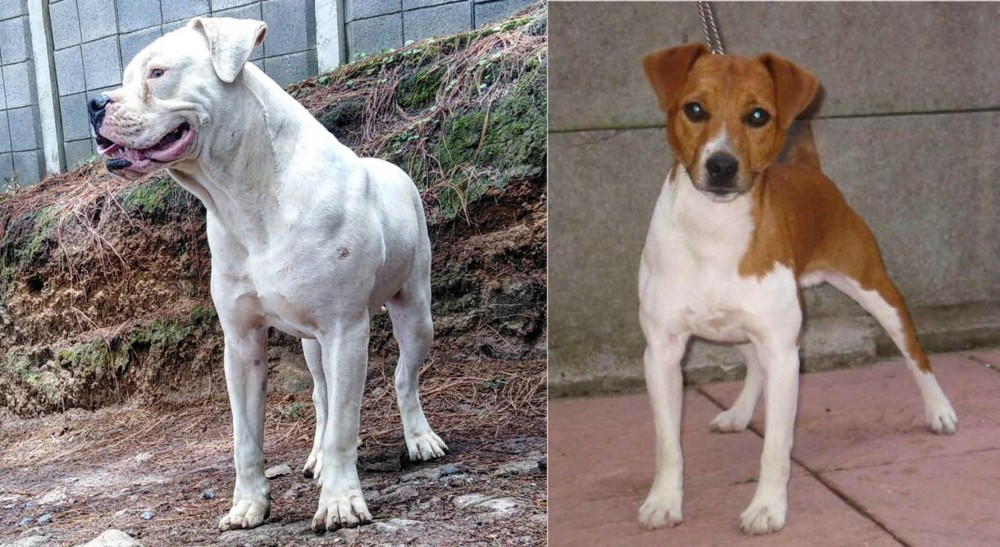 Dogo Guatemalteco is originated from Guatemala but Plummer Terrier is originated from United Kingdom. Dogo Guatemalteco may grow 24 cm / 10 inches higher than Plummer Terrier. Dogo Guatemalteco may weigh 37 kg / 82 pounds more than Plummer Terrier. Dogo Guatemalteco may live 3 years less than Plummer Terrier. Dogo Guatemalteco may have more litter size than Plummer Terrier. Dogo Guatemalteco requires Moderate Maintenance. But Plummer Terrier requires Low Maintenance
Dogo Guatemalteco is originated from Guatemala but Plummer Terrier is originated from United Kingdom. Dogo Guatemalteco may grow 24 cm / 10 inches higher than Plummer Terrier. Dogo Guatemalteco may weigh 37 kg / 82 pounds more than Plummer Terrier. Dogo Guatemalteco may live 3 years less than Plummer Terrier. Dogo Guatemalteco may have more litter size than Plummer Terrier. Dogo Guatemalteco requires Moderate Maintenance. But Plummer Terrier requires Low Maintenance
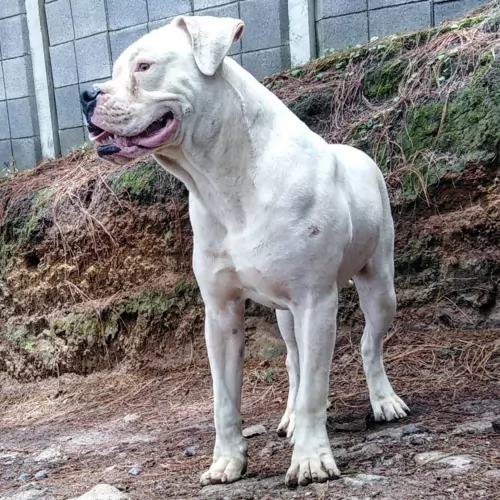 Known as the Guatemalteco Bull Terrier or Guatemalan Molosser, the Dogo Guatemalteco is also known as the Bull Terrier Guatemalteco, Guatemalan Bull Terrier, and Guatemalan Molosser.
Known as the Guatemalteco Bull Terrier or Guatemalan Molosser, the Dogo Guatemalteco is also known as the Bull Terrier Guatemalteco, Guatemalan Bull Terrier, and Guatemalan Molosser.
This big Molosser-type dog originates in Guatemala. In the 20th century, it was known as the Bullterrier Guatemalteco, but at the end of the century, it was changed to Dogo Guatemalteco.
Today, while the dog is kept as a companion dog, most are working guard dogs. The Dogo Guatemalteco isn’t recognized by any major international kennel clubs. However, the Kennel Club of Guatemala has given full recognition to this dog and it was in 1981 that the Guatemalan government named the dog as their national dog breed.
 This purebred dog was developed by Dr David Brian Plummer in the UK. The whole idea for developing the dog was for it to be an all-purpose dog that could also hunt down vermin.
This purebred dog was developed by Dr David Brian Plummer in the UK. The whole idea for developing the dog was for it to be an all-purpose dog that could also hunt down vermin.
Developed in the 1960s, the Plummer Terrier combines Jack Russell Terrier, Beagle, and red Fell Terrier blood. Later on, a Bull Terrier was brought in too. This created some problems and certain characteristics were selectively bred out of the Plummer.
Today, as a working terrier, the dog is versatile and has many uses. He may not be recognized by any major organizations, but there is at least a well-established Plummer Terrier club in the UK.
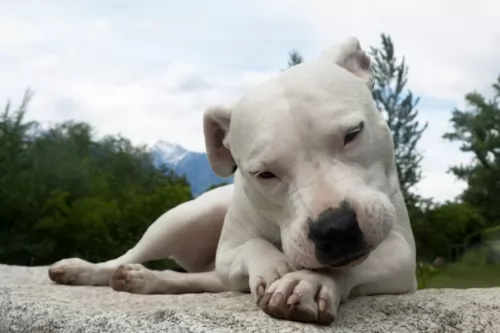 The Guatemalteco is a medium to large dog standing at 54 – 60cm and weighing between 40-45kg. He has a short, smooth coat and is essentially white with some black markings on the head.
The Guatemalteco is a medium to large dog standing at 54 – 60cm and weighing between 40-45kg. He has a short, smooth coat and is essentially white with some black markings on the head.
This breed was created from a crossing between a bull terrier, boxer and dalmatian. Some of the dogs are thickly built, while others are more leaner and athletic looking.
The ears of the dog vary quite a bit because while sometimes the ears fold down closely to the head, others are semi-pricked. There are some dog owners who have their dogs ears cropped into fully erect triangular shapes. The eye are small and usually dark brown.
The Dogo Guatemalteco is a fearless, evenly tempered dog. He was bred as a guard dog and he wants to protect his human family, forming a deep bond with them. It makes them difficult to re-home because of this.
It is imperative to have this dog trained and socialized because it might believe its the leader of the pack in your home. He is quite capable of getting along well with children and pets in the home. Because of his dominant nature, he isn’t suited as a pet for the first-time dog owner. He also doesn’t warm easily to strangers.
 The Plummer Terrier is a small, working terrier standing at between 28 and 36cm both male and female and weighing between 5 and 8kg.
The Plummer Terrier is a small, working terrier standing at between 28 and 36cm both male and female and weighing between 5 and 8kg.
The ears of the dog are high set and are fairly short, being floppy. The Plummer Terrier has a white and red/orangey coat which is short. He is an average shedder.
The tail would traditionally be docked, giving him an attractive, compact look, but these days the tail tends to be left long. The eyes are almond-shaped, dark brown and alert.
Your Plummer Terrier is active, hardy and adaptable, making it that he can settle down into life in the city or in the countryside. They will however, require regular exercise.
They’re the kind of dogs which are at home inside or outside. They’re very intelligent and can easily be trained and socialized. They’re also loving and loyal towards their human family. He is good with kids too and is playful and energetic around them, giving as good as he gets. His alert, intelligent nature makes him a good watchdog.
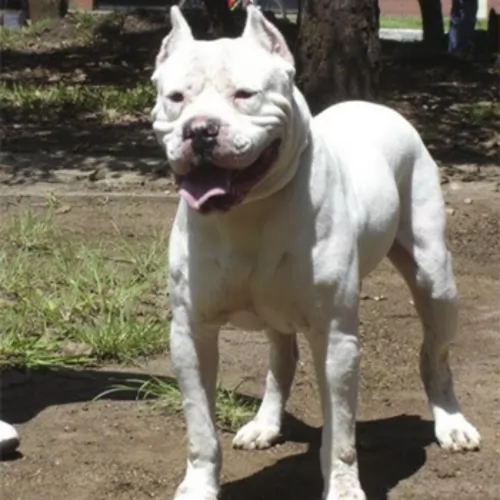 Your Dogo Guatemalteco is an intelligent dog breed, and because he is strong-willed and stubborn he might give you a hard time during training. It is possible though and it is important as the training will turn him into an obedient, relaxed dog, able to get on with all his family members, including pets.
Your Dogo Guatemalteco is an intelligent dog breed, and because he is strong-willed and stubborn he might give you a hard time during training. It is possible though and it is important as the training will turn him into an obedient, relaxed dog, able to get on with all his family members, including pets.
He is an energetic dog and will require walks and other forms of exercise each day.
This is certainly not the kind of dog that you buy to protect your property and provide little else for him except food and water. Frustration on the dog’s part can lead to destructive behavior and aggression.
 Your Plummer Terrier promises to be a great companion and family pet, getting on well with children.
Your Plummer Terrier promises to be a great companion and family pet, getting on well with children.
They’re intelligent too, so they’re easy to train. Being low maintenance and being a healthy breed too, the Plummer Terrier has got everything that people want from a canine friend - love, devotion, action, low maintenance, health and a wonderfully companionable nature.
 This dog can be susceptible to skin allergies. The skin is sensitive and prone to rashes.
This dog can be susceptible to skin allergies. The skin is sensitive and prone to rashes.
Another health concern with this dog because of his white coat, is congenital deafness. The deafness could be in one- or both ears.
The dog could also experience lameness, of which the most common problem is hip dysplasia. Because skeletal problems occur in this breed, it is advisable for owners to have their pet tested by the Orthopedic Foundation for Animals.
 These feisty little dogs are known to be a robust, healthy breed and with good care can reach between 12 and 15 years of age, and maybe older.
These feisty little dogs are known to be a robust, healthy breed and with good care can reach between 12 and 15 years of age, and maybe older.
Some common dog diseases that your Plummer Terrier might succumb too, but which is highly unlikely.
Distemper and parvovirus are two example of these infectious diseases. Parvovirus is deadly and can be picked up through contact with the feces of an infected dog. Your dog will be vomiting, won’t want to eat and will no doubt also have bloody diarrhea.
Distemper is transmitted through contact with an infected dog’s urine or blood. Symptoms include difficulty with breathing, fever and diarrhea. There are vaccines available for the prevention of these life-threatening diseases.
This disease can be debilitating for your pet and can include incontinence and bacterial infections. You’ll find your pet trying to urinate frequently but producing small drops of urine. Don’t hesitate – get your pet to the vet immediately.
You have to be careful with dental disease because many people think it affects just the teeth but it is linked to problems with the heart, kidneys and to diabetes. To prevent dental problems, look inside your dog’s mouth regularly and get him to a vet or professional dog groomer to attend to the tooth.
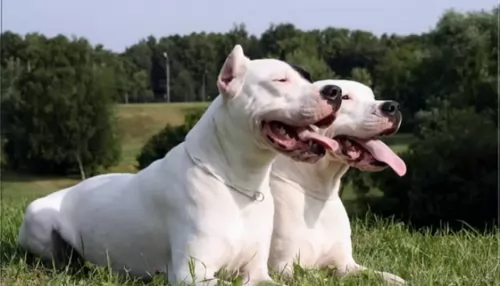 The coat of the dog is short and harsh and it sheds throughout the year. While he is still looked upon as a low maintenance dog, regular brushing will be required twice a week.
The coat of the dog is short and harsh and it sheds throughout the year. While he is still looked upon as a low maintenance dog, regular brushing will be required twice a week.
Because he is a dog breed that is susceptible to skin allergies, bathing isn't necessary as it removes the dog’s natural oils.
Other areas of grooming for this dog are brushing his teeth twice a week, trimming his nails and checking his ears.
Always choose a high quality dog food for your Dogo Guatemalteco and look at the feeding recommendations on the packaging.
When you feed your pet kibble, you can also mix in some cooked brown rice, vegetable and chicken for variety and contentment.
Raw meat is also advised from time to time. Don’t just go on and on through the years feeding your dog the same amount of food, as there are factors to take into account when deciding on food quantity. The age of your dog, it’s stage of life and its activity levels will mean regulating your pet’s food to match his needs.
 He is an active, energetic little dog and loves nothing more than to be darting after a ball, going for long walks with you or jumping into a pool. He’s happiest when active and busy with his beloved family members.
He is an active, energetic little dog and loves nothing more than to be darting after a ball, going for long walks with you or jumping into a pool. He’s happiest when active and busy with his beloved family members.
With his short coat and being a moderate shedder, you’ll just have to give your Plummer a good brush twice a week to keep the coat free of loose hairs and dust.
Always aim to give your dogs the best food there is. Dogs are just like people when it comes to food – nutritious, quality food helps towards good health and longevity. Apart from a good quality commercially manufactured food, give him some homemade food as a treat too. Simple, tasty food is best appreciated by dogs. They don’t want spicy, exotic foods that can upset their stomachs.
They love boiled chicken, brown rice or pasta and healthy vegetables such as sweet potatoes, carrots and spinach. You can add this into the dry kibble occasionally as a treat, and also some raw meat from time to time. Your pet will be healthy and happy with such a diet. Make sure he always has a bowl of cool, fresh water within reach.